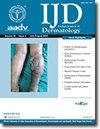口服托法替尼对难治性中度至重度特应性皮炎患者的实际疗效和安全性:一项多中心回顾性研究
IF 1.3
4区 医学
Q4 DERMATOLOGY
引用次数: 0
摘要
背景特应性皮炎(AD)的病因复杂,包括Th2极化,伴随着细胞因子IL4、IL-5、IL-13和IL-31,以及Th17和Th22,在慢性皮损中还包括Th1细胞。托法替尼通过选择性阻断JAK1和JAK3受体抑制Th1、Th2和Th17相关细胞因子。我们进行了一项多中心、回顾性图表分析,以研究托法替尼对中重度难治性AD患者的疗效和安全性。材料与方法我们纳入了16名中重度AD成年患者(年龄大于18岁),他们曾接受过系统治疗,但反应不佳。基线调查包括人口统计学数据、既往治疗史、严重程度评分(湿疹面积和严重程度指数[EASI]和SCORing特应性皮炎[SCORAD])以及生活质量评分(皮肤科生活质量指数[DLQI])。此外,还进行了基线血液检查,包括全血细胞计数、肝功能检测、肾功能检测、血脂分析和结核干扰素γ释放检测。每月对患者进行随访,为期 6 个月,包括记录严重程度评分、血液检查和 DLQI。结果所有 16 名患者都完成了为期 6 个月的试验。我们的患者之前接受过环孢素(10 例)、甲氨蝶呤(3 例)或两种药物治疗(3 例)。平均 EASI 评分从基线时的 23.38 ± 9.56 分提高到 6 个月结束时的 8.50 ± 7.57 分。SCORAD 平均得分从基线时的 41.25 ± 8.69 分提高到 6 个月后的 14.93 ± 7.82 分。生活质量也有所改善,平均 DLQI 从基线时的 15.18 ± 2.73 分提高到研究结束时的 5.31 ± 4.11 分。研究未发现严重不良反应,但有3名患者出现血脂异常,2名患者出血时间改变。本文章由计算机程序翻译,如有差异,请以英文原文为准。
Real-World Efficacy and Safety of Oral Tofacitinib in Patients with Refractory Moderate to Severe Atopic Dermatitis: A Multicenter Retrospective Study.
Background
Atopic dermatitis (AD) has a complex etiology that includes Th2 polarization, which is accompanied by the cytokines IL4, IL-5, IL-13, and IL-31, as well as Th17 and Th22, and in chronic lesions, Th1 cells. Tofacitinib inhibits Th1-, Th2-, and Th17-associated cytokines by selectively blocking JAK1 and JAK3 receptors. We conducted a multicentric, retrospective chart analysis to study the efficacy and safety of tofacitinib in patients with moderate to severe refractory AD.
Materials and Methods
We included 16 adult patients (aged >18 years) with moderate to severe AD who had previously undergone systemic therapy with inadequate response. In the baseline, demographic data, previous treatment history, severity scores (eczema area and severity index [EASI] and SCORing Atopic Dermatitis [SCORAD]), and quality of life score (Dermatology Life Quality Index [DLQI]) were noted. Baseline blood investigations, including complete blood count, liver function test, renal function test, lipid profile, and interferon gamma release assay for tuberculosis, were done. Patients were followed up every month for 6 months that included documentation of severity scores, blood investigations, and DLQI. Any adverse events, if reported, were noted.
Result
All 16 patients completed the 6-month trial. Our patients were previously treated with cyclosporine (n = 10), methotrexate (n = 3), or both (n = 3). The mean EASI scores improved from 23.38 ± 9.56 at baseline to 8.50 ± 7.57 at the end of 6 months. The mean SCORAD score improved from 41.25 ± 8.69 at baseline to 14.93 ± 7.82 at the end of 6 months. Quality of life also improved as the mean DLQI improved from 15.18 ± 2.73 at baseline to 5.31 ± 4.11 at the end of the study period. No severe adverse reactions were noted, but 3 patients experienced dyslipidemia and 2 patients had altered bleeding time.
Conclusion
Tofacitinib is a safe and effective treatment option for recalcitrant moderate to severe adult AD.
求助全文
通过发布文献求助,成功后即可免费获取论文全文。
去求助
来源期刊

Indian Journal of Dermatology
Medicine-Dermatology
CiteScore
1.80
自引率
0.00%
发文量
217
审稿时长
47 weeks
期刊介绍:
The journal publishes information related to skin-pathology and different modes of therapeutics, including dermatosurgery and cosmetic dermatology. Likewise, it carries articles on leprosy, STI and HIV/AIDS. The editorial board encourages the authors to publish articles addressing emerging techniques and developments in the subject specialty, in the form of Original investigations, Narrative and Systematic Reviews as well as Case Reports. The journal aims at publishing Editorials and Commentaries from eminent personalities on a regular basis.
 求助内容:
求助内容: 应助结果提醒方式:
应助结果提醒方式:


